研究生 英语阅读教程 第三版 课文 Lesson 13
工程硕士英语基础教程学生用书(第三版)第13课英文原文及分段中文翻译

U13A Simple Truth About Happiness关于快乐的简单真相If you're waiting for it,you've missed the point如果你正在等待快乐,那么你将错失良机Each of us owes it to our spouses, our children, our friends to be as happy as we can be. Anyone can be unhappy; it takes no courage or effort. True achievement lies in struggling to be happy.我们每个人为了让我们的配偶、孩子、朋友快乐,都要尽可能的做到快乐。
任何人都可以感到不快乐,那不需要任何勇气和努力。
但是努力寻找快乐才是一个人真正的成就。
The concept that we have to work at happiness comes as news to many people. We assume it's a feeling that comes as a result of good things that just happen to us, things over which we have little or no control.致力于寻找快乐对许多人来说是一个全新的观念。
我们通常认为快乐是伴随着某些美好的事物而来的,这些事物是我们碰巧碰到的,而不是我们可以掌控的。
But the opposite is true: happiness is largely under our control. It is a battle to be waged and not a feeling to be awaited.但是,事实却相反,快乐完全在我们的掌控之中。
(完整版)研究生英语阅读教程第三版课文Lesson1
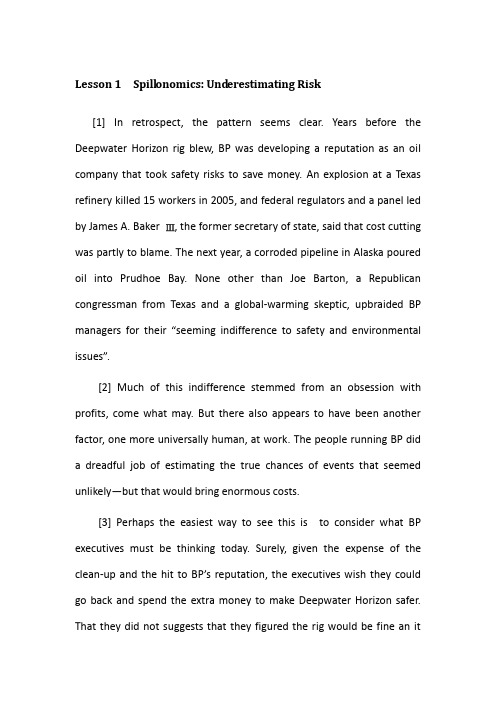
Lesson 1 Spillonomics: Underestimating Risk[1] In retrospect, the pattern seems clear. Years before the Deepwater Horizon rig blew, BP was developing a reputation as an oil company that took safety risks to save money. An explosion at a Texas refinery killed 15 workers in 2005, and federal regulators and a panel led by James A. BakerⅢ, the former secretary of state, said that cost cutting was partly to blame. The next year, a corroded pipeline in Alaska poured oil into Prudhoe Bay. None other than Joe Barton, a Republican congressman from Texas and a global-warming skeptic, upbraided BP managers for their “seeming indifference to safety and environmental issues”.[2] Much of this indifference stemmed from an obsession with profits, come what may. But there also appears to have been another factor, one more universally human, at work. The people running BP did a dreadful job of estimating the true chances of events that seemed unlikely—but that would bring enormous costs.[3] Perhaps the easiest way to see this is to consider what BP executives must be thinking today. Surely, given the expense of the clean-up and the hit to BP’s reputation, the executives wish they could go back and spend the extra money to make Deepwater Horizon safer. That they did not suggests that they figured the rig would be fine an itwas.[4]For all the criticism BP executives may deserve, they are far from the only people to struggle with such low-probability, high-cost events. Nearly everyone does. “These are precisely the kinds of events that are hard for us as humans to get our hands around and react to rationally, ”Robert N. Stavins, an environmental economist at Harvard, says. We make two basic—and opposite—types of mistakes. When an event is difficult to imagine, we tend to underestimate its likelihood. This is the proverbial black swan. Most of the people running Deepwater Horizon probably never had a rig explode on them. So they assumed it would not happen , at least not to them.[5] Similarly, Ben Bernanke and Alan Greenspan liked to argue, not so long ago, that the national real estate market was not in a bubble because it had never been in one before. Wall Street traders took the same view and built mathematical models that did not allow for the possibility that house prices would decline. And may home buyers signed up for unaffordable mortgages, believing they could refinance or sell the house once its price rose. That’s what house prices did, it seemed.[6]On the other hand, when an unlikely event is all too easy to imagine, we often go in the opposite direction and overestimate the odds. After the 9/11 attacks, Americans canceled plane trips and took to the road. There were no terrorist attacks in this country in 2002, yet theadditional driving apparently led to an increase in traffic fatalities.[7]When the stakes are high enough, it falls to government to help its citizens avoid these entirely human errors. The market, left to its own devices, often cannot do so. Yet in the case of Deepwater Horizon, government policy actually went the other way. It encouraged BP to underestimate the odds of a catastrophe.[8] In a little-noticed provision in a 1990 law passed after the Exxon Valdez spill, Congress capped a spiller’s liability over and above cleanup costs at $7500 million for a rig spill. Even if the party is on the hook for only $7500 million. (In this instance, BP has agreed to waive the cap for claims it deems legitimate. ) Michael Greenstone, an M.I.T. economist who runs the Hamilton Project in Washington, says the law fundamentally distorts a company’s decision making. Without the cap, executives would have to weigh the possible revenue from a well against the cost of drilling there and the risk of damage. With the cap, they can largely ignore the potential damage beyond cleanup costs. So they end up drilling wells even in places where the damage can be horrific, like close to a shoreline. To put it another way, human frailty helped BP’s executives underestimate the chance of a low-probability, high-cost event. Federal law helped them underestimate the costs.[9] In the wake of Deepwater Horizon, Congress and Obama administration will no doubt be tempted to pass laws meant to reducethe risks of another deep-water disaster. Certainly there are some sensible steps they can take, like lifting the liability cap and freeing regulators from the sway of industry. But it would be foolish to think that the only risks we are still underestimating are the ones that have suddenly become salient.[10]The big financial risk is no longer a housing bubble. Instead, it may be the huge deficits that the growth of Medicare, Medicaid and Social Security will cause in coming years—and the possibility that lender will eventually become nervous about extending credit to Washington. True, some economists and policy makers insist the country should not get worked up about this possibility, because lenders have never soured on the Unite States government before and show no signs of doing so now. but isn’t that reminiscent of the old Bernanke-Greenspan tune about the housing market?[11]Then, of course, there are the greenhouse gases that oil wells ( among other things) send into the atmosphere even when the wells function properly. Scientists say the buildup of these gases is already likely to warm the planet by at least three degrees over the next century and cause droughts, storms and more ice-cap melting. The researcher’s estimates have risen recently, too, and it is also possible the planet could get around 12 degree hotter. That kind of could flood major cities and cause parts of Antarctica to collapse.[12]Nothing like that has ever happened before. Even imagining it is difficult. It is much easier to hope that the odds of such an outcome are vanishingly small. In fact, it’s only natural to have this hope. But that doesn’t make it wise.。
unit 13研究生英语读与写(第三版)-

Background information
Roundup Ready Crops:
Roundup Ready Crops (RR Crops) are genetically engineered crops that have had their DNA altered to allow them to withstand the herbicide glyphosate (the active ingredient of Monsanto's herbicide Roundup). They are also known as “glyphosate tolerant crops.” RR crops that have been deregulated in the U.S. include: corn, soybeans, canola, cotton, sugarbeets, and alfalfa.
over-the-counter
pharmaceutical
drugs
(medications), vaccines, biopharmaceuticals, blood
transfusions, medical devices, electromagnetic
radiation emitting devices (ERED), and veterinary
products.
Background information
US FDA:
The FDA also enforces other laws, notably Section 361 of the Public Health Service Act and associated regulations. Many of these regulations are not directly related to food or drugs. These include laws governing sanitation requirements on interstate travel, the control of diseases on products for household pets to sperm donations for assisted reproduction.
研究生英语阅读教程基础级第三版
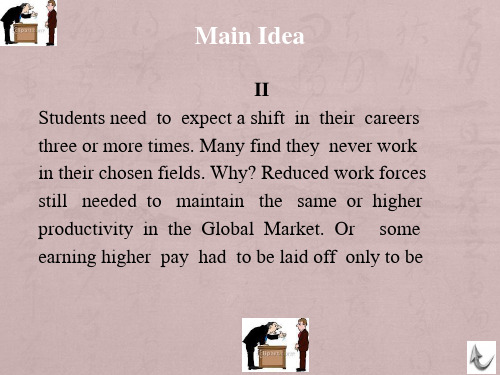
Main Idea
replaced by part time or contract workers for less pay. Some government agencies have downsized, some from funding cuts. Now graduates need to learn how to fit into this new work world.
2) n [u] the ideas, feelings, or opinions that are most important to a particular group of people or have the greatest influence on them at a particular time
●这家餐馆有酒类销售执照。 This restaurant is licensed to sell alclhol.
●药剂师获准开处方配药。 The pharmacist is licensed to dispense drugs.
Language Points
2. pulse n [c] singular 1) the regular beat that can be felt, for example at your wrist, as your heart pumps blood around your body ; heartbeat
7. query n (line 2, para.5) 1) a question, especially one asking for information or
expressing a doubt about sth
● 我们的助理很乐意回答诸位的疑问。 Our assistants will be happy to answer your queries.
研究生英语阅读教程Unit13

In general, responses to music are able to be observed. It has been proven that music influences humans both in good and bad ways. These effects are instant and long lasting. Music is thought to link all of the emotional, spiritual, and physical elements of the universe. Music can also be used to change a person's mood, and has been found to cause like physical responses in many people simultaneously. Music also has the ability to strengthen or weaken emotions from a particular event such as a funeral.
The power of music can also be seen in the arena of therapy. Music is one of the oldest tools used for therapy. Drums and rattles were used by medicine men as a symbol of their power over the spirits of sickness. Plato, in his book Charnides, talks about the healing power of music. Many Parkinson's disease patients can overcome the effects of the disease by listening to certain types of music. The music helps brain messages to organize and flow and puts the brain into a higher gear. Music can also be used with mental patients who have schizophrenia or depressive psychosis as a way to "contact" them, to get them back into reality. However, for the music to be effective, it has to be liked by the patient.
研究生英语阅读教程(李光立基础级第三版)1-12课后习题答案翻译
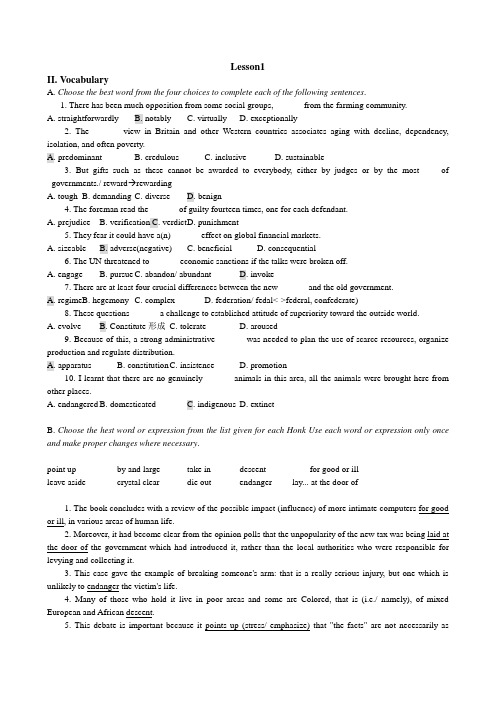
8. Let usleave asideother relevant factors such as education, career structure, pay and conditions of service and concentrate on (focus on) manpower management.(relate A to B)
A. toughB. demandingC. diverseD. benign
4. The foreman read the ______ of guilty fourteen times, one for each defendant.
A. prejudiceB. verificationC. verdictD. punishment
3. This case gave the example of breaking someone's arm: that is a really serious injury, but one which is unlikely toendangerthe victim's life.
4. Many of those who hold it live in poor areas and some are Colored, that is (i.e./ namely), of mixed European and Africandescent.
《研究生英语阅读教程》(基础级)第三版课文译文
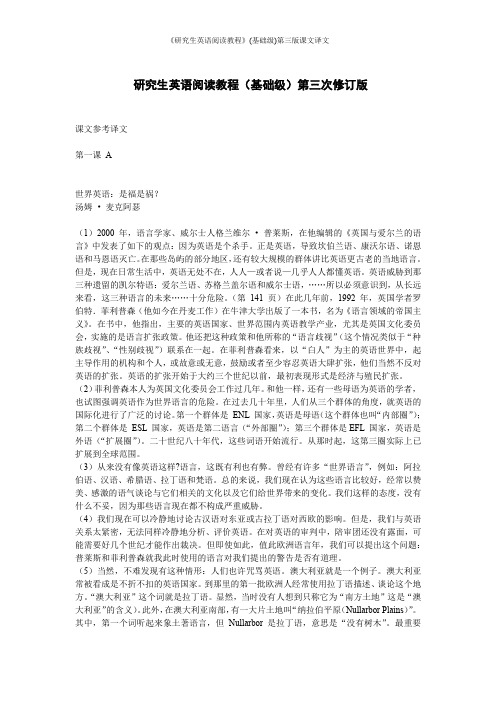
研究生英语阅读教程(基础级)第三次修订版课文参考译文第一课A世界英语:是福是祸?汤姆•麦克阿瑟(1)2000 年,语言学家、威尔士人格兰维尔•普莱斯,在他编辑的《英国与爱尔兰的语言》中发表了如下的观点:因为英语是个杀手。
正是英语,导致坎伯兰语、康沃尔语、诺恩语和马恩语灭亡。
在那些岛屿的部分地区,还有较大规模的群体讲比英语更古老的当地语言。
但是,现在日常生活中,英语无处不在,人人—或者说—几乎人人都懂英语。
英语威胁到那三种遗留的凯尔特语:爱尔兰语、苏格兰盖尔语和威尔士语,……所以必须意识到,从长远来看,这三种语言的未来……十分危险。
(第141 页)在此几年前,1992 年,英国学者罗伯特.菲利普森(他如今在丹麦工作)在牛津大学出版了一本书,名为《语言领域的帝国主义》。
在书中,他指出,主要的英语国家、世界范围内英语教学产业,尤其是英国文化委员会,实施的是语言扩张政策。
他还把这种政策和他所称的“语言歧视”(这个情况类似于“种族歧视”、“性别歧视”)联系在一起。
在菲利普森看来,以“白人”为主的英语世界中,起主导作用的机构和个人,鼓励或者至少容忍英语大肆扩张,他们当然不反对英语的扩张。
英语的扩张开始于大约三个世纪以前,最初表现形式是经济与殖民扩张。
(2)菲利普森本人为英国文化委员会工作过几年。
和他一样,还有一些母语为英语的学者,也试图强调英语作为世界语言的危险。
在过去几十年里,人们从三个群体的角度,就英语的国际化进行了广泛的讨论。
第一个群体是ENL 国家,英语是母语(这个群体也叫“内部圈”);第二个群体是ESL 国家,英语是第二语言(“外部圈”);第三个群体是EFL 国家,英语是外语(“扩展圈”)。
二十世纪八十年代,这些词语开始流行。
从那时起,这第三圈实际上已扩展到全球范围。
(3)从来没有像英语这样?语言,这既有利也有弊。
曾经有许多“世界语言”,例如:阿拉伯语、汉语、希腊语、拉丁语和梵语。
总的来说,我们现在认为这些语言比较好,经常以赞美、感激的语气谈论与它们相关的文化以及它们给世界带来的变化。
李观仪《新编英语教程》(第3版)(课文精解 Unit 13)【圣才出品】
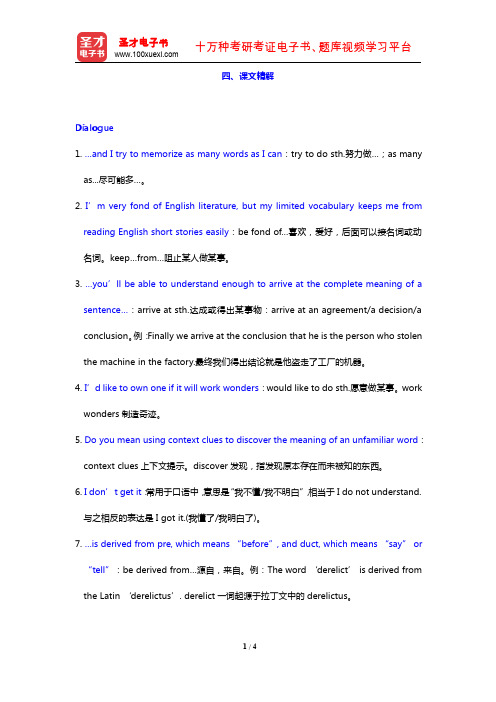
四、课文精解Dialogue1.…and I try to memorize as many words as I can:try to do sth.努力做…;as many as...尽可能多…。
2.I’m very fond of English literature,but my limited vocabulary keeps me from reading English short stories easily:be fond of…喜欢,爱好,后面可以接名词或动名词。
keep…from…阻止某人做某事。
3.…you’ll be able to understand enough to arrive at the complete meaning of a sentence…:arrive at sth.达成或得出某事物:arrive at an agreement/a decision/a conclusion。
例:Finally we arrive at the conclusion that he is the person who stolen the machine in the factory.最终我们得出结论就是他盗走了工厂的机器。
4.I’d like to own one if it will work wonders:would like to do sth.愿意做某事。
work wonders制造奇迹。
5.Do you mean using context clues to discover the meaning of an unfamiliar word:context clues上下文提示。
discover发现,指发现原本存在而未被知的东西。
6.I don’t get it:常用于口语中,意思是“我不懂/我不明白”,相当于I do not understand.与之相反的表达是I got it.(我懂了/我明白了)。
- 1、下载文档前请自行甄别文档内容的完整性,平台不提供额外的编辑、内容补充、找答案等附加服务。
- 2、"仅部分预览"的文档,不可在线预览部分如存在完整性等问题,可反馈申请退款(可完整预览的文档不适用该条件!)。
- 3、如文档侵犯您的权益,请联系客服反馈,我们会尽快为您处理(人工客服工作时间:9:00-18:30)。
Cat in the RainErnest Hemingway[1] There were only two Americans stopping at the hotel. They did not know any of the people they passed on the stairs on the way to and from their room. Their room was on the second floor facing the sea. It also faced the public garden and the war monument. There were big palms and green benches in the public garden. In the good weather there was always an artist with his easel. Artists liked the way the palms grew and the bright colors of the hotels facing the gardens and the sea. Italians came from a long way off to look up at the war monument. It was made of bronze and glistened in the rain. It was raining. The rain dripped from the palm trees. Water stood in pools on the gravel paths. The sea broke in a long line in the rain and slipped down the beach to come up and break again in a long line in the rain. Motorcars were gone from the square by the war monument. Across the square in the doorway of the cafe a waiter stood looking out at the empty square. The American wife stood at the window looking out. Outside right under their window a cat was crouched under one of the dripping green tables. The cat was trying to make herself so compact that she would not be dripped on.[2] “I’m going down and get that kitty, ” the American wife said.[3] “I’ll do it, ” her husband offered from the bed.[4] “No, I’ll get it. The poor kitty out trying to keep dry under a table.”[5] The husband went on reading, lying propped up with the pillows at the foot of the bed.[6] “Don’t get wet,” he said.[7] The wife went downstairs and the hotel owner stood up and bowed to her as she passed the office. His desk was at the far end of the office. He was an old man and very tall.[8] “ll piove,” the wife said. She liked the hotelkeeper.[9] “Si, si, Signora, brutto temp o. It’s very bad weather. ”[10] He stood behind his desk in the far end of the dim room. The wife liked him. She liked the deadly serious way he received any complaints. She liked his dignity. She liked the way he wanted to serve her. She liked the way he felt about being a hotelkeeper. She liked his old, heavyface and big hands. Liking him she opened the door and looked out. It was raining harder. A man in a rubber cape was crossing the empty square to the cafe. The cat would be around to the right. Perhaps she could go along under the eaves. As she stood in the doorway an umbrella opened behind her. It was the maid who looked after their room.[11] “You must not get wet,” she smiled, speaking Italian. Of course, the hotelkeeper had sent her.[12] With the maid holding the umbrella over her, she walked along the gravel path until she was under their window. The table was there, washed bright in the rain, but the cat was gone. She was suddenly disappointed. The maid looked up at her.[13] “Ha perduto qualque cosa, Signora?”[14] “There was a cat,” said the American girl.[15] “A cat?”[16] “Si, il gatto.”[17] “ A cat?” the maid laughed. “A cat in the rain?”[18] “Ye s,” she said, “under the table.” Then, “Oh, I wanted it so much. I wanted a kitty.”[19] When she talked English the maid’s face tightened.[20] “Come, Signora,” she said.“We must get back inside. You will be wet.”[21] “I suppose so,” said the American girl.[22] They went back along the gravel path and passed in the door. The maid stayed outside to close the umbrella. As the American girl passed the office, the padrone bowed from his desk. Something felt very small and tight inside the girl. The padrone made her feel very small and at the same time really important. She went on up the stairs. She had a momentary feeling of being of supreme importance. She opened the door of the room. George was on the bed, reading.[23] “Did you get the cat?” he asked, putting the book down.[24] “It was gone.”[25] “Wonder where it went to,” he said, resting his eyes from reading. She sat down on the bed.[26] “I wanted it so much,” she said. “I don’t know why I wanted it so much. I wanted the poor kitty. It isn’t any fun to be a poor kitty out in the rain.”[27] George was reading again.[28] She went over and went in front of the mirror of the dressing table looking at herself with the hand glass. She studied her profile, first one side and then the other. Then she studied the back of her head and her neck.[29] “Don’t you think it would be a good idea if I let my hair grow out?” she asked, looking at her profile again. George looked up and saw the back of her neck, clipped close like a boy’s.[30] “I like it the way it is.”[31] “I get so tired of it,” she said. “I get so tired of looking like a boy.”[32] George shifted his position in the bed. He hadn’t looked away from her since she stared to speak.[33] “You look pretty darn nice,” he said.[34] She laid the mirror down on the dresser and went over to the window and looked out. It was getting dark.[35] “I want to pull my hair back tight and smooth and make a big knot at the back that I can feel,” she said. “I want to have a kitty to sit on my lap and purr when I stroke her.”[36] “Yeah?” George said from the bed.[37] “And I want to eat at a table with my own silver and I want candles. And I want it to be spring and I want to brush my hair out in front of a mirror and I want a kitty and I want some new clothes.”[38] “Oh, shut up and get something to read,” George said. He was reading again. His wife was looking out of the window. It was quite dark now and still raining in the palm trees.[39] “Anyway, I want a cat,” she said, “I want a cat now. If I can’t have long hair or any fun,I can have a cat.”[40] George was not listening. He was reading his book. His wife looked out of the window where the light had come on in the square.[41] Someone knocked at the door.[42] “Avanti,” George said. He looked up from his book.[43] In the doorway stood the maid. She held a big tortoiseshell cat pressed tight against her and its tail swung down against her body.[44] “Excuse me,” she said, “the padrone asked me to bring this for the Signora.”(1139 words)。
